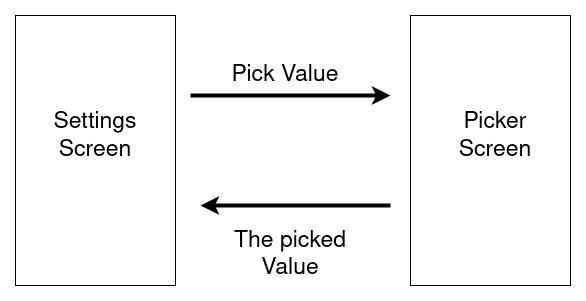Jetpack Navigation. A convenient API for returning a result to the previous Destination.

Introduction
I often need to launch a screen B(child) from a screen A(parent). A user does some actions on screen B, for example, picks color using a full-screen color picker. When the user picked the color, he presses the “Done” button. The app navigates back to screen A. Child screen B needs to pass the picked color to its parent screen A.
Jetpack Navigation Architecture component calls the passing result from child to parent screen a “Returning a result to the previous Destination”
But I don’t like the code from the official guide. It looks too complex for such a task. Don’t worry if you don’t understand it.
val navController = findNavController();
// After a configuration change or process death, the currentBackStackEntry
// points to the dialog destination, so you must use getBackStackEntry()
// with the specific ID of your destination to ensure we always
// get the right NavBackStackEntry
val navBackStackEntry = navController.getBackStackEntry(R.id.your_fragment)
// Create our observer and add it to the NavBackStackEntry's lifecycle
val observer = LifecycleEventObserver { _, event ->
if (event == Lifecycle.Event.ON_RESUME
&& navBackStackEntry.savedStateHandle.contains("key")) {
val result = navBackStackEntry.savedStateHandle.get<String>("key");
// Do something with the result
}
}
navBackStackEntry.lifecycle.addObserver(observer)
// As addObserver() does not automatically remove the observer, we
// call removeObserver() manually when the view lifecycle is destroyed
viewLifecycleOwner.lifecycle.addObserver(LifecycleEventObserver { _, event ->
if (event == Lifecycle.Event.ON_DESTROY) {
navBackStackEntry.lifecycle.removeObserver(observer)
}
})
The approach above works fine. But I don’t want to see this code in many fragments of my app. An obvious solution for me was to write a wrapper that uses the official approach under the hood but provides a convenient API.
I implemented the wrapper. Here’s how I get a result from a child screen(previous destination):
findNavController().handleResult<PickIntervalResult>(
viewLifecycleOwner,
R.id.navigation_notifications, // current destination
R.id.pickNotificationIntervalFragment // child destination
) { result ->
binding.textNotifications.text = result.toString()
}
And here’s how to return a result to a parent from a child:
findNavController().finishWithResult(PickIntervalResult.WEEKLY)
Hope this wrapper can be useful for you as well. To implement a similar wrapper read this article or go straight to the code in github and play with the example app.
Pass result to a parent from a child screen
To pass result to a parent screen, just put it in the saved state handle of parent’s back stack entry.
fun <T : Parcelable> NavController.finishWithResult(result: T) {
val currentDestinationId = currentDestination?.id
if (currentDestinationId != null) {
previousBackStackEntry?.savedStateHandle?.set(resultName(currentDestinationId), result)
}
popBackStack()
}
private fun resultName(resultSourceId: Int) = "result-$resultSourceId"
The saved state handle is a map of keys and values.
I put the result as a value.
Key is generated based on the child screen destination id by resultName function.
Key contains the id of the child screen because the parent could have a few children,
and it needs to know the source of the result.
Passing a result to a parent is the last step on every children’s screen.
Close the current screen on the last step calling popBackStack().
SavedStateHandle doesn’t work with any class because it deals with a process death.
That’s why generic type T must implement Parcelable.
Get result in a parent from a child
To get result back in a parent just take the result from the saved state handle.
private fun <T : Parcelable> handleResultFromChild(
@IdRes childDestinationId: Int,
currentEntry: NavBackStackEntry,
handler: (T) -> Unit
) {
val expectedResultKey = resultName(childDestinationId)
if (currentEntry.savedStateHandle.contains(expectedResultKey)) {
val result = currentEntry.savedStateHandle.get<T>(expectedResultKey)
handler(result!!)
currentEntry.savedStateHandle.remove<T>(expectedResultKey)
}
}
Handle result only when the app navigates back from a child to a parent.
To do so observe lifecycle of the parent’s back stack entry, handle result on ON_RESUME event.
fun <T : Parcelable> NavController.handleResult(
lifecycleOwner: LifecycleOwner,
@IdRes currentDestinationId: Int,
@IdRes childDestinationId: Int,
handler: (T) -> Unit
) {
// `getCurrentBackStackEntry` doesn't work in case of recovery from the process death when dialog is opened.
val currentEntry = getBackStackEntry(currentDestinationId)
val observer = LifecycleEventObserver { _, event ->
if (event == Lifecycle.Event.ON_RESUME) {
handleResultFromChild(childDestinationId, currentEntry, handler)
}
}
currentEntry.lifecycle.addObserver(observer)
lifecycleOwner.lifecycle.addObserver(LifecycleEventObserver { _, event ->
if (event == Lifecycle.Event.ON_DESTROY) {
currentEntry.lifecycle.removeObserver(observer)
}
})
}
The code above also stops all listeners when the parent screen dies.
This is it
Go and try the wrapper in the example app. Hope the wrapper makes your code easier as well.